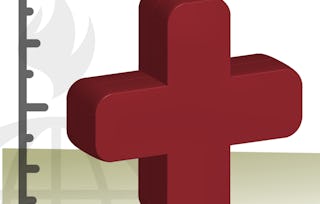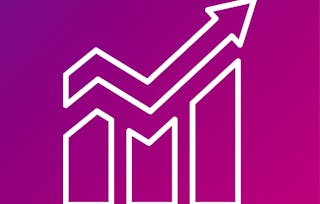Biostatistics is the application of statistical reasoning to the life sciences, and it's the key to unlocking the data gathered by researchers and the evidence presented in the scientific public health literature. In this course, we'll focus on the use of simple regression methods to determine the relationship between an outcome of interest and a single predictor via a linear equation. Along the way, you'll be introduced to a variety of methods, and you'll practice interpreting data and performing calculations on real data from published studies. Topics include logistic regression, confidence intervals, p-values, Cox regression, confounding, adjustment, and effect modification.

Simple Regression Analysis in Public Health
Ends soon: Gain next-level skills with Coursera Plus for $199 (regularly $399). Save now.

Simple Regression Analysis in Public Health
This course is part of Biostatistics in Public Health Specialization

Instructor: John McGready, PhD, MS
16,416 already enrolled
Included with
(387 reviews)
Recommended experience
What you'll learn
Practice simple regression methods to determine relationships between an outcome and a predictor
Recognize confounding in statistical analysis
Perform estimate adjustments
Skills you'll gain
Details to know

Add to your LinkedIn profile
9 assignments
See how employees at top companies are mastering in-demand skills

Build your subject-matter expertise
- Learn new concepts from industry experts
- Gain a foundational understanding of a subject or tool
- Develop job-relevant skills with hands-on projects
- Earn a shareable career certificate

There are 5 modules in this course
Module one covers simple regression, the four different types of regression, commonalities between them, and simple linear aggression. Before completing the graded quiz, you can test your knowledge with the practice quiz.
What's included
8 videos2 readings2 assignments
Within module two, we will look at logistic regression, create confidence intervals, and estimate p-values. You will have the opportunity to test your knowledge in both a practice quiz and a graded quiz.
What's included
7 videos2 readings2 assignments
Module three focuses on Cox regression with different predictors. You will have the opportunity to test your knowledge first with the practice quiz and, then, with the graded quiz.
What's included
7 videos2 readings2 assignments
Within module four, you will look at confounding and adjustment, and unadjusted and adjusted association estimates. Additionally, you will learn about effect modification. Similar to previous modules, you will first take a practice quiz before completing the graded quiz.
What's included
10 videos1 reading2 assignments
During this module, you get the chance to demonstrate what you've learned by putting yourself in the shoes of biostatistical consultant on two different studies, one about self-administration of injectable contraception and one about medical appointment scheduling in Brazil. The two research teams have asked you to help them interpret previously published results in order to inform the planning of their own studies. If you've already taken other courses in this specialization, then this scenario will be familiar.
What's included
1 reading1 assignment
Earn a career certificate
Add this credential to your LinkedIn profile, resume, or CV. Share it on social media and in your performance review.
Instructor

Offered by
Explore more from Public Health
 Status: Free Trial
Status: Free TrialJohns Hopkins University
 Status: Free Trial
Status: Free TrialImperial College London
 Status: Free Trial
Status: Free TrialJohns Hopkins University
 Status: Free Trial
Status: Free TrialImperial College London
Why people choose Coursera for their career




Learner reviews
387 reviews
- 5 stars
77.51%
- 4 stars
18.08%
- 3 stars
2.58%
- 2 stars
1.29%
- 1 star
0.51%
Showing 3 of 387
Reviewed on Oct 18, 2019
The course content was great. However, there was some technical problems.
Reviewed on Dec 9, 2020
Complex analyses clearly explained, with an emphasis on interpretation rather than on mechanics. Excellent examples from published literature used throughout. Highly recommended!
Reviewed on Mar 21, 2023
Very happy that all I requested for was attended to i.e explanation especially of the summative assessment and others as required.Thank you so very much for making the learning impactful

Open new doors with Coursera Plus
Unlimited access to 10,000+ world-class courses, hands-on projects, and job-ready certificate programs - all included in your subscription
Advance your career with an online degree
Earn a degree from world-class universities - 100% online
Join over 3,400 global companies that choose Coursera for Business
Upskill your employees to excel in the digital economy
Frequently asked questions
To access the course materials, assignments and to earn a Certificate, you will need to purchase the Certificate experience when you enroll in a course. You can try a Free Trial instead, or apply for Financial Aid. The course may offer 'Full Course, No Certificate' instead. This option lets you see all course materials, submit required assessments, and get a final grade. This also means that you will not be able to purchase a Certificate experience.
When you enroll in the course, you get access to all of the courses in the Specialization, and you earn a certificate when you complete the work. Your electronic Certificate will be added to your Accomplishments page - from there, you can print your Certificate or add it to your LinkedIn profile.
Yes. In select learning programs, you can apply for financial aid or a scholarship if you can’t afford the enrollment fee. If fin aid or scholarship is available for your learning program selection, you’ll find a link to apply on the description page.
More questions
Financial aid available,

